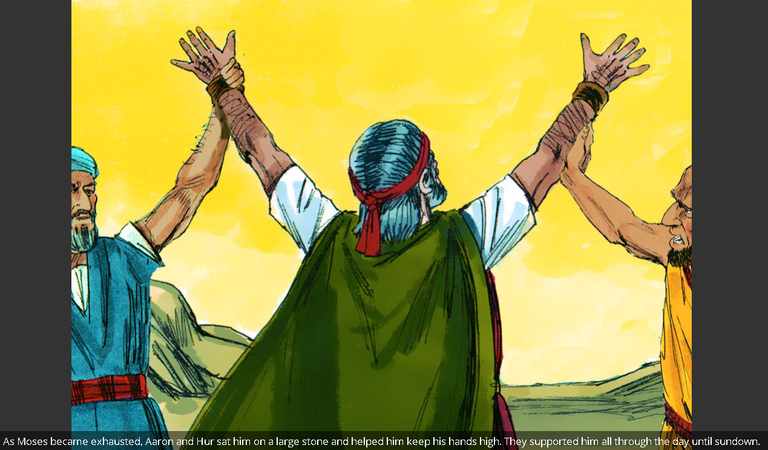Battle at Rephidim

At Rephidim, the Jews of Moses' generation encountered a serious threat that could wipe out their existence as a nation. This threat is far more dangerous than the "water crisis" and "civil unrest".
In this post, we will explore a battle story at Rephidim. Here, we find a hostile nation determined to destroy Israel. It is surprising that though the Amalekites knew what happened to Egypt, still didn't fear the God of Israel. They thought that with their might they could annihilate the young nation.
In this battle story, we see that victory belongs to the Lord. Moreover, there are three lessons we can learn from this battle victory.
Though the battle belongs to the Lord, it doesn't mean that you will do nothing.
Divine sovereignty and human responsibility go together. The one does not negate the other.
Moses, after seeing the Amalekites attacked the Israelites, he gave Joshua an order:
Choose some of our men and go out to fight the Amalekites. Tomorrow I will stand on top of the hill with the staff of God in my hands.
Joshua did exactly what Moses ordered him to do. The fact that Moses held the staff of God in his hands didn't mean an automatic victory in battle without the actual fight. Joshua had to assemble fighting men to confront the Amalekites.
In facing a battle, it is important for hands to reach the throne of God in prayer.
We read:
As long as Moses held up his hands, the Israelites were winning . . .
In a naturalist worldview, stories like this do not make sense. How can one explain the connection between the raising of hands on top of the hill to what's going on in the actual battlefield? Perhaps, it made more sense if Moses, Aaron, and Hur had taken their weapons and joined Joshua and the selected men on the battlefield.
However, this is not what we found in the text. The story clearly shows that Moses, Aaron, and Hur were not wasting time for anything up there on the hill. They were fighting a battle in the Lord's way.
Perhaps, some interpreters who see this as a kind of spiritual battle would say that Moses and the two men were confronting the evil forces that control the Amalekites in the unseen realm. If this interpretation is accepted, then Moses, Aaron, and Hur were facing a far more powerful demonic force in the heavenly realm.
Though the foregoing interpretation would have some credit in a supernaturalist worldview nevertheless, the text is silent. The plain reading of the story just shows us that there is a connection between the lifting of hands of the three men and the status of the military confrontation.
In winning a battle, all credit must be given to God alone.
After the battle victory, God gave Moses an instruction:
Write this on a scroll as something to be remembered and make sure that Joshua hears it because I will completely blot out the name of Amalek from under heaven.
This appears that God made this battle against the Amalekites very personal.
Moreover, except from making a record of the battle:
Moses built an altar and called it The Lord is my Banner.
This tells us that Israel won this battle because God intervened in this fight.
In Psalm 20 verses 4 and 5, the reference to a banner is associated with the act of God's deliverance using His mighty hands:
But for those who fear you, you have raised a banner to be unfurled against the bow. Save us and help us with your right hand, so that those you love may be delivered.
Conclusion
In this battle story, we learn the importance of human participation, prayer, and giving all the glory to God in winning the battles in life.